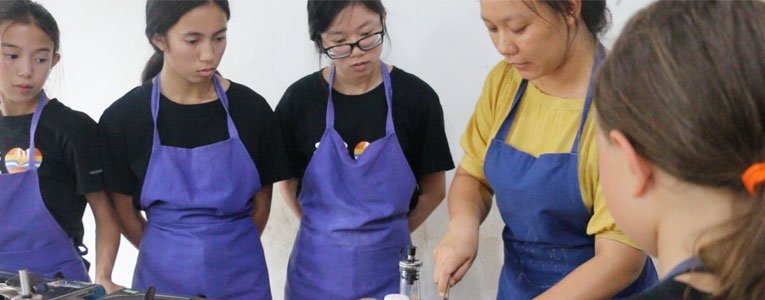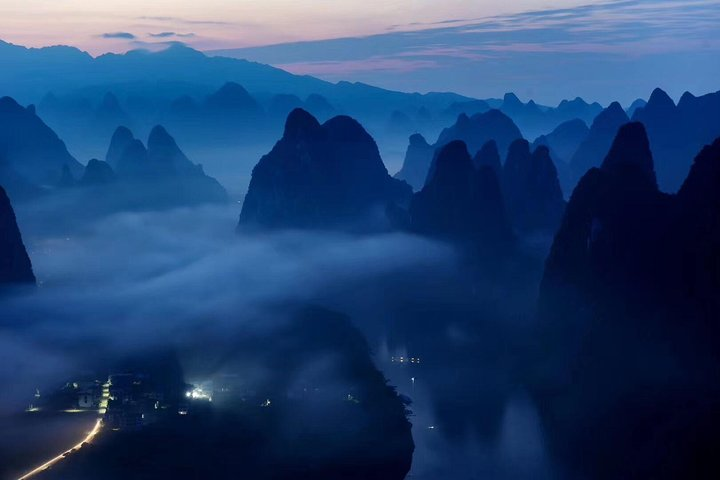When I first arrived in China, I had a checklist like any first-time traveler would—walk the Great Wall, explore the Forbidden City, eat xiaolongbao in Shanghai. But after a few weeks zig-zagging through megacities, I started craving stillness. I wanted to slow down and just be in a place. That’s when I found Yangshuo, a quiet riverside town nestled in southern China’s Guangxi province.
What I thought would be a short detour turned into one of the most profound and peaceful experiences of my life. Yangshuo wasn’t just scenic—it felt like a dream unfolding in real life.
The Li River – Cruising Through a Watercolor Painting
Most people arrive in Yangshuo via a Li River cruise from Guilin, and honestly, there’s no better way to begin. The boat drifted slowly past towering limestone karst mountains, their green slopes dissolving into clouds. Mist curled along the water like ink, and for a while, no one on the boat spoke—we were all too stunned by the landscape around us.
Fishermen in conical hats glided silently on bamboo rafts, accompanied by their trained cormorants. It felt like I had stepped into an ancient scroll painting, where every frame was drenched in tranquility and history.
📌 Travel Tip: Sit on the top deck, even if it’s cold or rainy. Bring a jacket and a camera—but more importantly, take time to look without a lens.

Yangshuo Town – Between Lanterns and Lime Trees
Yangshuo town itself is a mix of charming chaos and unexpected calm. The main street is bustling, with cafes, noodle shops, and souvenir stalls spilling onto cobblestone alleys. But walk just a few blocks out, and everything changes. You’ll hear birds instead of scooters, and the air smells like citrus and woodsmoke.
I stayed in a small guesthouse called Outside Inn, tucked between orange groves and rice fields. It was family-run, simple, and surrounded by towering karst cliffs. Every morning I woke to the sound of roosters and distant chanting from a nearby temple.
One evening, I wandered through West Street, the beating heart of Yangshuo after dark. Red lanterns swayed overhead, music drifted from rooftop bars, and I tried stinky tofu for the first (and last) time. But even in the crowds, there was a laid-back rhythm—no one seemed in a rush, and everyone smiled.
📌 Travel Tip: Avoid West Street at peak hours if you’re crowd-averse, but go at night for food and atmosphere. Try the local specialty: beer fish (啤酒鱼), made with freshly caught carp, chili, and local brew.
Biking Through Rice Paddies and Karst Valleys
The real magic of Yangshuo begins when you leave the town behind.
I rented a bike for about 20 yuan a day and took a route through Yulong River Valley. Within minutes, the road narrowed into a peaceful trail flanked by rice paddies, bamboo groves, and tiny farming villages. I passed water buffalo grazing lazily, women washing clothes in clear streams, and children waving from behind wooden fences.
I stopped at a family-run noodle shack for a bowl of hand-pulled noodles with peanut sauce, ate under a tree, and watched the wind ripple through the fields. Time moved differently here. Slower. Softer.
The highlight of the ride was crossing the ancient Yulong Bridge, a 600-year-old stone arch that offers sweeping views of the river below, where bamboo rafts glide past at a dreamy pace.
📌 Travel Tip: Start early in the morning to avoid heat and crowds. Use offline maps—signal drops in the countryside. If you’re unsure, locals are more than happy to point the way, often with big smiles and hand gestures.
A Temple in the Hills and a Hill With a Hole
There’s something spiritual about Yangshuo’s karst peaks—they feel like sentinels, watching over the land.
One morning, I hiked to Moon Hill, a limestone arch perched above the valley. The trail is steep but paved with stone steps. Locals (mostly elderly women) will offer you cold water and fans halfway up—and somehow they’re still faster than you.
At the top, a giant hole frames the valley like a window to another world. I sat there for an hour, sweaty and breathless, just watching the clouds roll in and out like ocean waves.
📌 Travel Tip: The best light is early morning or just before sunset. Wear good shoes—the steps can be slippery if it’s rained.
Cooking with Locals – A Taste of China I’ll Never Forget
One of the most rewarding parts of the trip was taking a Chinese cooking class with a local woman named Lin in her family courtyard. We started by biking to the village market to pick out ingredients—eggplants, garlic shoots, lotus root. Lin taught me how to make stir-fried eggplant with soy and ginger, stuffed dumplings, and sweet rice cakes rolled in sesame.
We laughed, made a mess, and shared a meal on her porch as the sun dipped behind the hills.
In that moment, I didn’t feel like a tourist. I felt like I had found a little corner of the world where everything was real and generous.

Sunset on the Yulong River – The Stillest Moment
On my last night, I took a bamboo raft ride along the Yulong River. There was no motor, just a long pole and an old man guiding us down the water. We moved slowly, past duck farms and quiet shores. The sun turned the sky to watercolor—orange, pink, and soft gold.
It was completely silent, except for the splash of the pole in the water and a heron flying overhead.
That stillness—complete and echoing—was the moment I knew I would never forget Yangshuo.
Why Yangshuo Matters
Yangshuo isn’t flashy. It’s not packed with world-famous landmarks. But it’s the kind of place that invites you to slow down, breathe deeper, and see more clearly.
It reminds you that beauty doesn’t always shout—it often whispers through fog, flows along rivers, and lives in the hands of someone teaching you to fold dumplings.
If you ever get the chance to visit, do it. But don’t go with a checklist. Go with curiosity. Get lost. Be quiet. Watch the mountains disappear into mist. And maybe, just maybe, you’ll find a version of yourself you hadn’t met yet.

